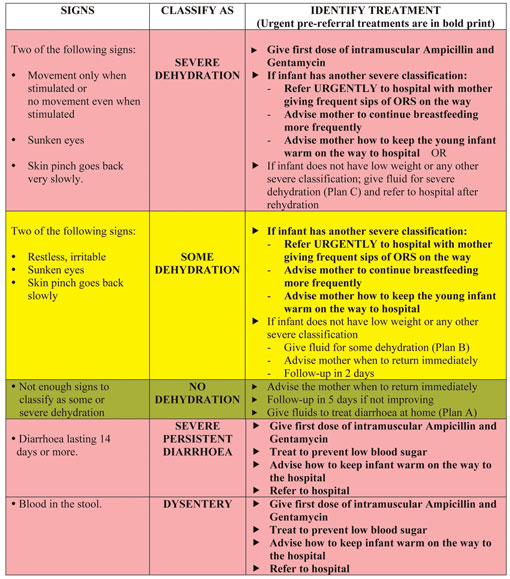Classify diarrhoea in young infants
A young infant who has had diarrhoea lasting for 14 days or more should be referred to hospital.
Diarrhoea in a young infant (below two months) is not classified in the same way as in an older infant or young child (two months to five years). The main difference is that for a young infant with diarrhoea lasting for 14 days or more the only classification is severe persistent diarrhoea. This is because 14 days represents a significant amount of time in a young infant’s life and they should be referred to hospital for treatment.
The main differences between classification and treatment for a young infant are the following:
- Movement only when stimulated or no movement even when stimulated (compared with lethargic or unconscious in a child).
- Treatment for a young infant with severe or some dehydration includes advising the mother how to keep her baby warm on the way to hospital.
- A young infant with diarrhoea lasting for 14 days or more is always classified as severe persistent diarrhoea (in a child, there also needs to be some or severe dehydration for a classification of severe persistent diarrhoea).
Table 5.4 sets out the classification and treatment of dehydration, dysentery and diarrhoea in the young infant. As you can see from Table 5.4, dysentery in a young child is a severe classification.

Table 5.4 How to classify and treat dehydration, diarrhoea and dysentery in a young infant.
In this study session you have looked at how to assess, classify and treat children and young infants with diarrhoea and dehydration. As you read in the introduction, diarrhoea is the second major cause of death in Ethiopia of children under five years old. Your role as a Health Extension Practitioner is therefore crucial in identifying the severity of the diarrhoea and dehydration in the sick child or young infant brought to your health post and in providing the best possible treatment and follow-up care for them. Knowing when to refer a child or young infant urgently to hospital is also important, since in some cases the special treatment available there is more likely to be effective than the treatment you can provide in a health post, in particular if you have limited resources available.